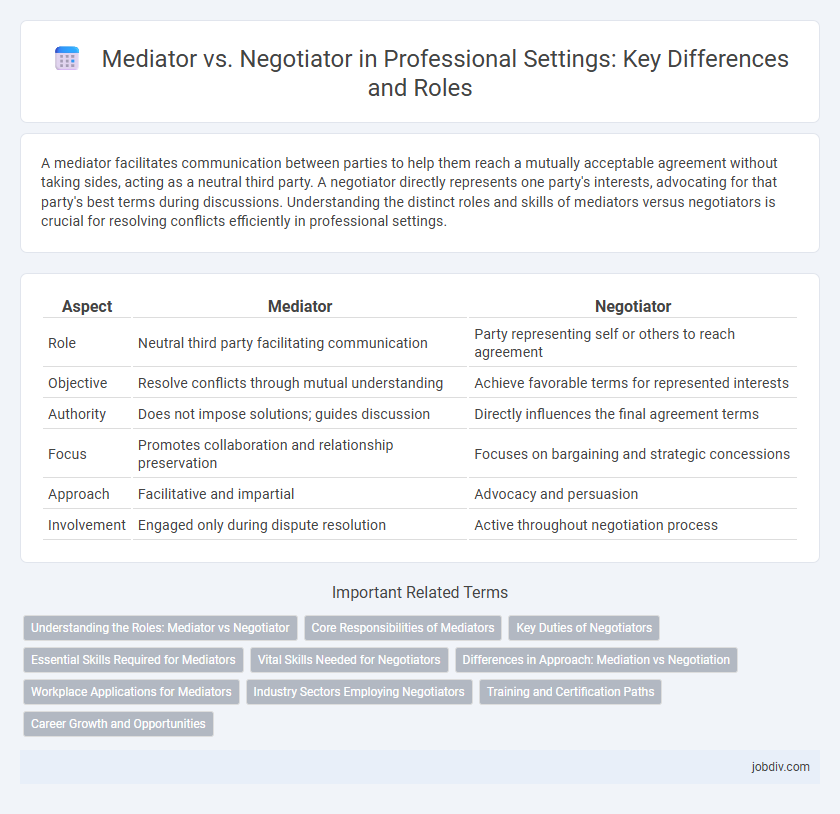A mediator facilitates communication between parties to help them reach a mutually acceptable agreement without taking sides, acting as a neutral third party. A negotiator directly represents one party's interests, advocating for that party's best terms during discussions. Understanding the distinct roles and skills of mediators versus negotiators is crucial for resolving conflicts efficiently in professional settings.
Table of Comparison
| Aspect | Mediator | Negotiator |
|---|---|---|
| Role | Neutral third party facilitating communication | Party representing self or others to reach agreement |
| Objective | Resolve conflicts through mutual understanding | Achieve favorable terms for represented interests |
| Authority | Does not impose solutions; guides discussion | Directly influences the final agreement terms |
| Focus | Promotes collaboration and relationship preservation | Focuses on bargaining and strategic concessions |
| Approach | Facilitative and impartial | Advocacy and persuasion |
| Involvement | Engaged only during dispute resolution | Active throughout negotiation process |
Understanding the Roles: Mediator vs Negotiator
A mediator facilitates communication between disputing parties to help them reach a mutually acceptable agreement without imposing solutions, prioritizing neutrality and confidentiality. A negotiator actively represents one party's interests, aiming to achieve the best possible outcome through direct bargaining and strategic concessions. Understanding these distinct roles enhances conflict resolution effectiveness by aligning the approach to the situation's needs.
Core Responsibilities of Mediators
Mediators facilitate communication between disputing parties to help them reach a mutual agreement, focusing on neutrality and impartiality throughout the process. Their core responsibilities include managing dialogue, identifying underlying interests, and guiding parties toward a voluntary resolution without imposing decisions. Unlike negotiators, mediators do not advocate for any side but work to create a collaborative environment that fosters understanding and consensus.
Key Duties of Negotiators
Negotiators are responsible for representing the interests of their parties by engaging in direct communication, crafting proposals, and making concessions to reach mutually acceptable agreements. They analyze the needs, priorities, and constraints of all involved stakeholders while strategizing to maximize value in the final deal. Effective negotiators employ persuasion, critical thinking, and conflict resolution skills to bridge gaps and finalize terms in commercial, legal, or diplomatic settings.
Essential Skills Required for Mediators
Effective mediators require active listening, impartiality, and strong emotional intelligence to facilitate constructive dialogue between conflicting parties. They must possess excellent communication skills, critical thinking abilities, and patience to manage disputes without imposing decisions. Unlike negotiators who advocate for specific interests, mediators focus on creating mutually agreeable solutions through neutrality and empathy.
Vital Skills Needed for Negotiators
Negotiators must possess exceptional communication and active listening skills to effectively understand interests and craft mutually beneficial agreements. Critical thinking and emotional intelligence enable negotiators to manage conflicts and influence outcomes strategically. Mastery of problem-solving techniques and adaptability ensures negotiators can navigate complex discussions and achieve successful resolutions.
Differences in Approach: Mediation vs Negotiation
Mediation involves a neutral third party facilitating communication between disputing parties to reach a mutually agreeable solution, emphasizing collaboration and neutrality. Negotiation is a direct dialogue between parties aiming to settle differences through compromise and strategy without third-party involvement. The mediator guides the process impartially, while negotiators actively advocate for their own interests.
Workplace Applications for Mediators
Mediators in the workplace facilitate open communication between conflicting parties to achieve mutually beneficial resolutions without imposing decisions. Unlike negotiators who primarily represent specific interests to strike deals, mediators remain neutral, guiding employees or management through structured dialogue to resolve disputes efficiently. Effective workplace mediation improves team dynamics, reduces litigation costs, and promotes a collaborative organizational culture.
Industry Sectors Employing Negotiators
Negotiators are extensively employed across diverse industry sectors including finance, healthcare, manufacturing, and technology, where securing favorable agreements and managing complex contracts are critical. Unlike mediators who facilitate dispute resolution impartially, negotiators actively represent their organization's interests during mergers, acquisitions, sales, and regulatory discussions. Their strategic communication and problem-solving skills drive successful deal closures, risk mitigation, and long-term partnerships within competitive markets.
Training and Certification Paths
Mediator training typically involves specialized courses in conflict resolution, communication skills, and ethical standards, often culminating in certification through recognized organizations such as the Association for Conflict Resolution (ACR) or the Mediation Training Institute (MTI). Negotiator training emphasizes strategic communication, negotiation tactics, and psychological principles, with certifications available from institutions like the Program on Negotiation at Harvard Law School or the Negotiation Institute. Both professionals benefit from continuous education and practical experience, but mediators often require formal certification to practice, while negotiators may pursue diverse credentials based on industry-specific needs.
Career Growth and Opportunities
A career as a mediator offers opportunities to specialize in conflict resolution across legal, corporate, and community sectors, enhancing negotiation skills and emotional intelligence. Negotiators, often embedded within sales, procurement, or diplomatic roles, develop expertise in deal-making, strategy, and persuasion, leading to leadership positions in business or international relations. Both pathways provide distinct career growth prospects by fostering critical communication abilities and expanding professional networks.
Mediator vs Negotiator Infographic

 jobdiv.com
jobdiv.com